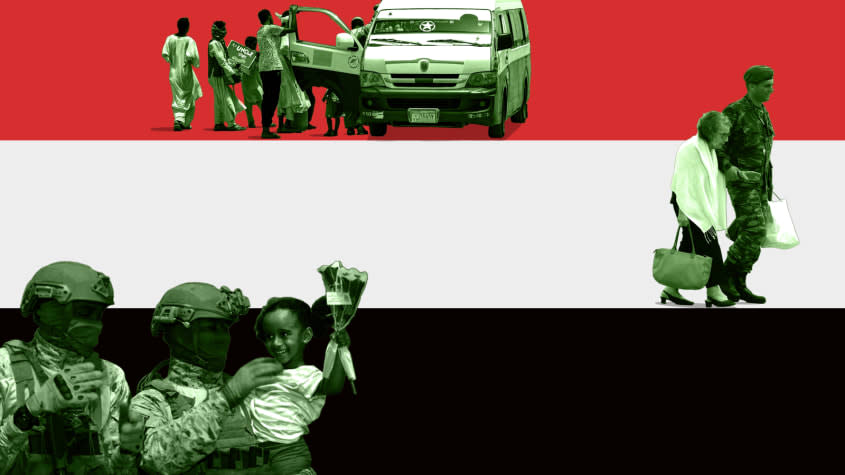Can Sudan's transition to democracy be saved?

U.S. special forces evacuated the staff of America's embassy in Sudan over the weekend. Thousands of U.S. citizens, including aid workers and Sudanese Americans, remained trapped in the northeast African nation as rival armed factions fight for control of the resource-rich country. The two warring sides agreed to a 72-hour cease-fire this week to allow time for more foreigners and civilians to flee.
Mortar shells have hit homes. Armed groups have looted houses and businesses, leaving civilians to choose between sheltering in their homes without food, or going out in search of provisions and risking getting caught in the crossfire. About 400 civilians have been killed since the shooting began. "The fire is getting stronger. We can't stay here," a Khartoum-based science teacher told The Washington Post. "If you do not die from the bombs, you will die of hunger. There is nothing in the markets to eat."
The fighting broke out between army forces controlled by Gen. Abdel Fattah al-Burhan, the country's de facto leader, and Gen. Mohamed Hamdan Dagalo, the head of the paramilitary Rapid Support Forces (RSF) that evolved from the Janjaweed militia that committed atrocities in Darfurr, as pressure mounted for transferring control of the country from the military to civilian leaders. The United States and other countries urged the generals to make peace and put the transition to democracy back on track.
Is there any hope for democracy now?
The generals' willingness to unleash "full-scale military warfare" on Khartoum illustrates "just how far the military will go to cling to power," said The Daily Maverick (South Africa) in an editorial. Burhan and his rival, known as Hemedti, signed the political Framework Agreement, along with pro-democracy elements led by the mainstream Forces of Freedom and Change, in Dec. 2022, committing to helping put the transition to democratic, civilian rule "back on track." Now that the two generals have shown they are willing "to plunge their country into all-out warfare, regardless of civilian casualties," to control "the spoils," it seems unlikely "either would really submit to civilian rule."
"The popular wave of protests that ousted long-time dictator Omar al-Bashir in 2019 feels like a very long time ago indeed," said Ella Joyner at DW.com. Back then, these rival generals were on the same side as the masses, working "together to help topple al-Bashir in 2019." First they turned on the people, and the democratic transition, in 2021 when they teamed up "to oust the fledgling civilian government, before ultimately turning on one another earlier this year." Sudan's neighbors and faraway powers like the U.S. won't be able to focus on "how to stop the bloodshed from escalating into civil war," much less how to put Sudan back on the path to democracy. For now, their priority is evacuating civilians and foreign aid workers before the fighting gets worse.
Neither general deserves to win
Burhan and Hemedti, longtime rivals, only "managed to bury their differences long enough to work together in a power-sharing deal to thwart any move toward civilian rule," said The Washington Post in an editorial. Now they are in a fight to the finish because both want to rule the country alone. "Both leaders need to check their egos, order their forces to stand down and observe an immediate cease-fire. Their casual disregard for civilians' lives, as well as their obvious disdain for the Sudanese people's clearly expressed democratic aspirations, shows that neither of them is fit to govern."
The generals aren't the only ones to blame, said Jacqueline Burns, a former adviser to the U.S. special envoy for Sudan and South Sudan, in The New York Times. When the 2005 Comprehensive Peace Agreement failed to end two decades of conflict, the international community fell into "a familiar pattern of never-ending peace negotiations" that pushed "armed belligerents" into "concessions that might lead to an end to the violence," but peace deals "that split power between armed groups — no matter how many provisions on political reforms are added — rarely leads to sustainable peace." All this does is legitimize them and make them the only "voices that need to be heard, while asking Sudanese citizens to quietly wait their turn."
You may also like
A complete timeline of George R.R. Martin's progress on The Winds of Winter

